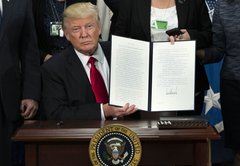Suspend immigration from terror-prone places
Donald Trump
“And if people don't like it, we've got to have a country folks. Got to have a country. Countries in which immigration will be suspended would include places like Syria and Libya. And we are going to stop the tens of thousands of people coming in from Syria.”
Trump-O-Meter

Promise Kept

